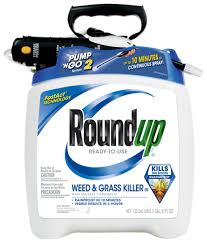 (Feb. 28, 2017) A California judge has ruled California can’t warn its citizens of Roundup’s cancer dangers. U.S. District Judge William B. Shubb claimed in his ruling Monday that there is not enough proof of glyphosate causes cancer to merit the addition of a cancer warning on Roundup’s label.
(Feb. 28, 2017) A California judge has ruled California can’t warn its citizens of Roundup’s cancer dangers. U.S. District Judge William B. Shubb claimed in his ruling Monday that there is not enough proof of glyphosate causes cancer to merit the addition of a cancer warning on Roundup’s label.Judge Shubb failed to examine the fact that the chemical makeup of Roundup is decidedly more toxic than just the active ingredient glyphosate alone. He failed to note that Monsanto continues to test safety by studying glyphosate acting alone, despite knowing that glyphosate is never applied alone, only as one ingredient in the herbicide, leaf adherent, stabilizer chemical mix that is Roundup. Monsanto did not produce studies of the Roundup mixture, despite some studies suggesting that the chemical combination can increase toxicity by perhaps as much as 1000 times.
The judge chose to rule exactly as Monsanto wished. He barred the state from requiring Monsanto to warn that glyphosate is a probable carcinogen. The judge said such a warning (on Roundup) would lead consumers to wrongly conclude that the chemical (glyphosate) definitely causes cancer.
Monsanto sues California
Monsanto and some corporate farm associations sued California state officials after the state added glyphosate to its list of substances “known to the state of California to cause cancer.” The judge pointed to the U.S. EPA and other agencies, which have ruled that glyphosate is not likely to cause cancer. He ignored or was never shown recent evidence which strongly suggests the EPA has colluded with Monsanto to delay or stifle further Roundup safety testing. At least one EPA scientist, Jess Rowland, emailed back and forth with Monsanto executives detailing her efforts inside the EPA to stifle Roundup safety review.
The judge further ignored the quality of the studies, and the vested interests of the sponsors of the studies, which have allegedly proven glyphosate is not a probable carcinogen. Virtually all of the studies which have found glyphosate is not carcinogenic were either sponsored by Monsanto, or they weren’t published in peer-reviewed publications, or they were small-sample studies that did not reach statistical significance.
Shubb wrote:
“The required warning for glyphosate does not appear to be factually accurate and uncontroversial because it conveys the message that glyphosate’s carcinogenicity is an undisputed fact, when almost all other regulators have concluded that there is insufficient evidence that glyphosate causes cancer.”
In November 2017, Monsanto and some corporate-run farm associations had specifically sued Lauren Zeise, director of the Office of Environmental Health Hazard Assessment, and Xavier Becerra, California’s attorney general. Monsanto and the others sought to stop California from including glyphosate on a list of chemicals “known to the state of California to cause cancer or reproductive toxicity.” Inclusion in the state’s Proposition 65 list requires businesses that sell glyphosate-containing products to include warning labels. Monsanto et al. argued that the warning requirement and list inclusion would violate the First Amendment by causing them to make “false, misleading, and highly controversial statements.”
Law 360 reported that the court said on Feb. 26 that “inclusion of glyphosate on the California list could be classified as government speech and therefore would not be regulated by the First Amendment. The warning label, however, would require commercial speech, since consumers would read it. Inclusion on the list would therefore need to be based on “purely factual and uncontroversial information,” as determined by the U.S. Supreme Court ruling in Zauderer v. Office of Disciplinary Counsel of Supreme Court.”
The court said that even if the warning that California “knows” the ingredient causes cancer is accurate, it nonetheless would mislead a reasonable consumer because multiple agencies have determined otherwise.
The court said a “reasonable consumer would not understand that a substance is ‘known to cause cancer’ where only one health organization had found that the substance in question causes cancer and virtually all other government agencies and health organizations that have reviewed studies on the chemical had found there was no evidence that it caused cancer.”
The IARC, which found glyphosate a probable human carcinogen, did not look at industry-sponsored studies, nor unpublished ones. Each of the other organizations looked only at studies of glyphosate used alone, studies that were sponsored by Monsanto. They gave equal weight to industry-sponsored studies and independent studies.
None of those agencies looked at studies of glyphosate toxicity when used as part of the complete Roundup chemical formulation, the only manner in which glyphosate is applied.
Related
- Monsanto Lawsuit
- Roundup Cancer Lawsuit

by Matthews & Associates




